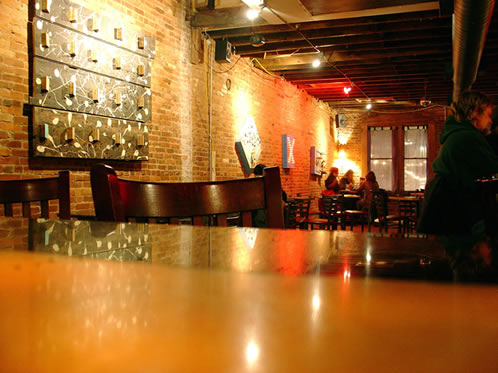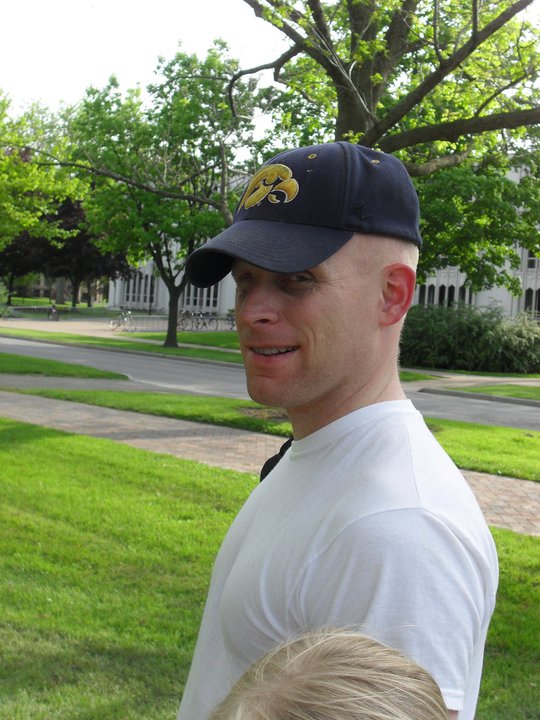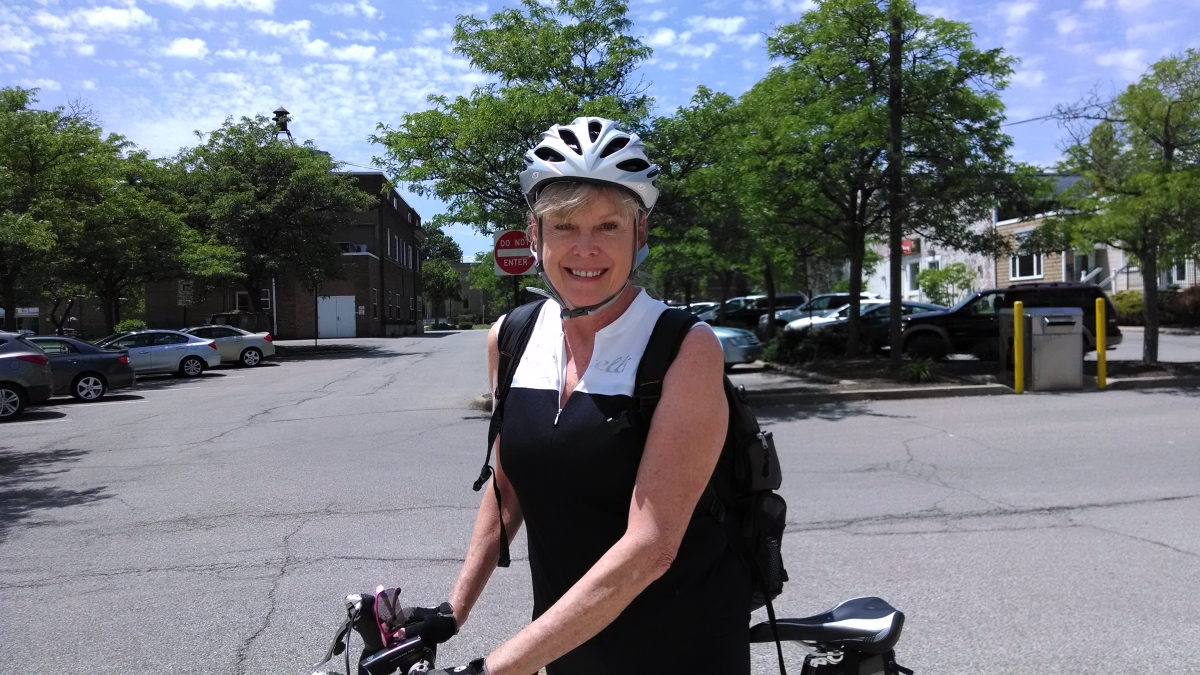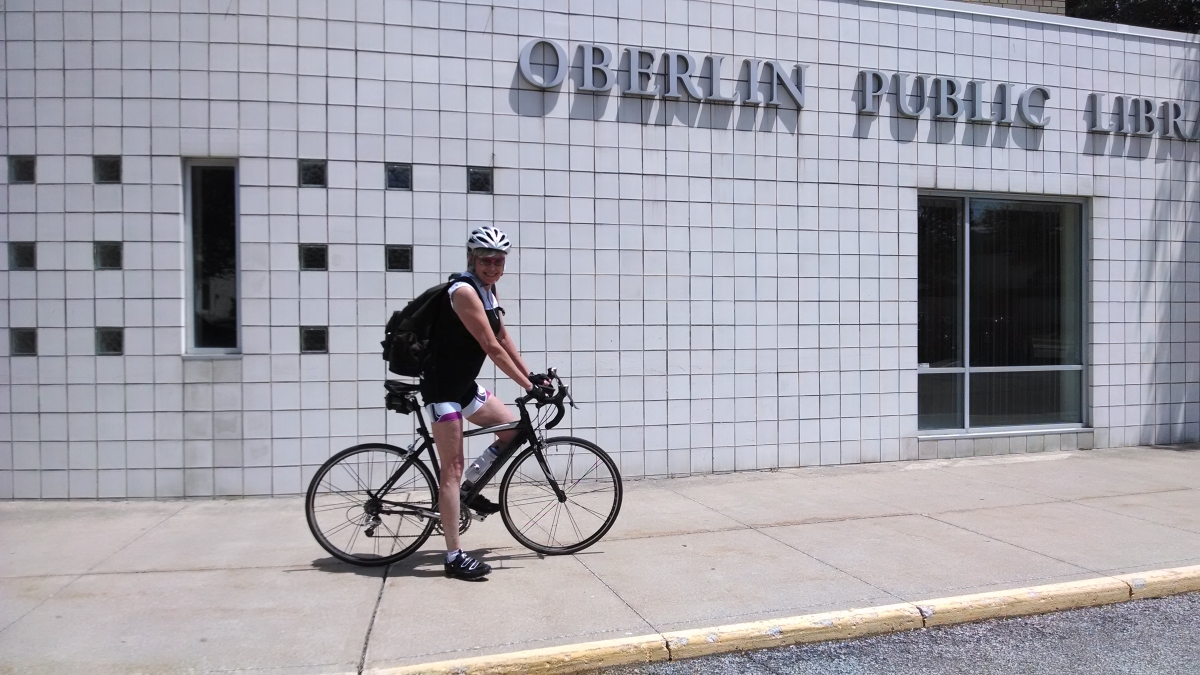 Matt Adelman (whose wife is the Assistant Director of the Oberlin Project) is an Oberlin resident and one of the owners of The Feve. He genuinely loves Oberlin and is committed to care for both the environment and the Oberlin community. He has taken steps with The Feve such as a recycling initiative, a lighting retrofit, and fundraisers for local non-profits.
Matt Adelman (whose wife is the Assistant Director of the Oberlin Project) is an Oberlin resident and one of the owners of The Feve. He genuinely loves Oberlin and is committed to care for both the environment and the Oberlin community. He has taken steps with The Feve such as a recycling initiative, a lighting retrofit, and fundraisers for local non-profits.
Q: What are some words and images you would use to describe Oberlin?
A: The first thing I think of is that Oberlin is changing. It’s a good time to be in Oberlin. I feel like there are some remarkable things happening that have a lot to do with the Oberlin Project. It’s a really important time for Oberlin as a community to come together with the college to have Oberlin stand out as something. Oberlin has a history of standing out in the world. Those things tend to be cyclical. So I think now is our opportunity for Oberlin as an entire community, college and city, to be a leader in something. And that is the Oberlin Project. I think that there are a lot of people in town that are encouraged by the possibility that brings and certainly we are at the Feve. I see it as an opportunity for businesses and residents and students to participate in something that is bigger than what many other places are doing in our country, and maybe set some examples for other places around the world.
Q: I’m curious how you would define sustainability, whether that be something that is environmental or some other combination of factors and how you see yourself fitting into that?
A: Sustainability I think is a word that gets overused. It has a specific meaning - sustainable is to be able to make something go on. People use it so freely in contexts that don’t really mean anything.
Q: Some people think of sustainability as something that embodies environmental concern, economic development, and also social justice. Do you think there’s a better word to describe all that?
A: That’s the million dollar question. I think that Oberlin can become a more sustainable community with practices of the Oberlin Project. So a lot of what needs to happen is people in the community need to understand the potential of this idea of sustainability. You hear buzz about what really is the Oberlin Project, these mutterings of gentrification which I think are incredibly inaccurate. It’s an incredible gift that Oberlin is getting to have people work on this project that covers more than environmental concerns, and creates economic development and jobs, to help all community members. But the word ‘sustainability’ has always been a word that makes me cringe.
Q: For lack of a better word at the time being, what are some of the specific sustainable actions that you’re taking at The Feve and in your own life?
A: We’ve not ever been big at tooting our own horn so we don’t really publicize the things that we do. We probably should do more of that and we probably will do more of that just so people can be educated. When somebody finds a place that they like, and they realize that place does those things that are important like recycling and such, then they’re more likely to do it themselves at home. For that reason, I think it’s more important for us to be a bit more local. We recently, through the Oberlin Project, learned of the rebate program that is available to businesses that allows you to purchase certain energy efficient items like light bulbs and equipment. So we replaced all our incandescent bulbs with LEDs. Currently, and this is not the full of extent of what our savings will be, we’re saving over 6000 watts an hour by replacing our incandescent bulbs. So we’ve saved a lot of money by doing this LED project. And the Oberlin Project helped us - the reason we could afford it was because of the rebate program, and you know, doing it helps us be a more active participant in the practices that the Oberlin Project is trying to do. The other things we do - we filter our grease to run our van. It’s a diesel van that has been converted to run on vegetable oil so all of the fryer grease that we use gets filtered and put into the van. We have since started recycling I would say over 95% of our corrugated cardboard, which has reduced the size of our dumpster. We try to recycle all of our glass and all of our aluminum and all of our plastic and all of our steel, and you know, we would be thrilled to be able to compost. We would be, dare I say, excited to use compostable carryout containers if that was something that was happening in our community. I would support the idea of making compost mandatory in town. To have curbside composting would be, well, the right thing for Oberlin to do, for a forward-thinking community. As far as The Feve goes, we’ve really reduced our waste to almost as little as we can possibly have. We’re probably saving millions of pounds of trash, I’m just guessing. But it would really have to be close to that - trash that would otherwise be going to the landfill.
Q: Do you have any specific messages about environmental consciousness or any other shape or form of sustainability that you would want to share with other community members?
A: We’re just trying to lead by example. We have the ability to be leaders and we are sort of leaders. And you know, with success in popularity, not everyone is going to like you, but we try to do what we can to be liked by everybody. We like to do what we do and we love Oberlin. Oberlin is such a great place. I really feel like I belong here, and we like doing things to make things good for people. And we just started doing this thing that doesn’t really apply but we just started doing these fundraisers for nonprofit organizations. Our first one we did for the stray cats, so we did an all you can eat taco bar that was $10, and all of that money went to cats. That evening they raised like $1500 bucks. So it’s something that we’re going to continue to do for different organizations, places that are in Oberlin. It’s just another thing we’re doing to help people in the community...so that’s that.
]]> Peter Comings is a resident of Oberlin who grew up in town and came back a few years ago with his family because of the positive, forward-thinking mindset he sees here. One of his hopes for Oberlin is that people come to see themselves as important parts of the sustainable, progressive actions Oberlin is taking.
Peter Comings is a resident of Oberlin who grew up in town and came back a few years ago with his family because of the positive, forward-thinking mindset he sees here. One of his hopes for Oberlin is that people come to see themselves as important parts of the sustainable, progressive actions Oberlin is taking.
Q: What are some words and images that first come to mind when describing Oberlin?
A: College, green, both the thought process and the actual world around. I grew up here born and raised, so I’m surprised in some ways by how little has changed in the town. The features of it are, much of them, still the same. I think that it’s a town that’s willing to try things.
Q: So you grew up here, but did you move out at any point?
A: Yeah, I graduated from high school, then left and went to Iowa for ten years, Michigan for ten years, and then three years ago moved back with my family.
Q: What made you decide to move back?
A: When I looked at Oberlin and Northeast Ohio I saw that the unemployment rate was marginally better and I had become aware of the Oberlin Project. And at the time, about 2009, we were still really feeling the initial shock wave of the markets doing what they were doing. And I see Oberlin trying to stand up and say we’re not gonna depend on forces outside of Oberlin, we’re gonna see what we can do inside of Oberlin to create something sustainable. And that seems like a very positive, forward-thinking move, like it would probably gain an enough traction to have a meaningful life to it. That and just the general cultural diversity.
Q: What does the word ‘sustainability’ mean to you?
A: I could answer that differently probably on any given day. So just stream of consciousness, sustainable is approaching development in a way that doesn’t burn itself out, whether it would burn itself out because of using up resources or having used up enthusiasm. Sustainable very obviously also has an environmental component. Some probably look at that as the primary definition of sustainable - water conservation, conserving electricity. And what I think is great about what I see as the Oberlin Project is that it tries to bring all of that together.
Q: What kind of things are you doing in your life that you would consider sustainable?
A: You know I turn off lights in the house, encourage the kids to take shorter showers. We buy from the farmers’ market. Other things - I want to vest myself more in the Oberlin Project to be a part of however that results in making things sustainable here. So I’ve, in the last year, tried to pay more attention to the Oberlin Project and how I can help be a part of the definitions that come from that.
Q: Do you have any specific messages you would like to share with other community members about why this is important and how we might make changes toward sustainability?
A: Well I gotta believe that a lot of the community already believes that. That’s what I want to believe. And maybe not everyone does. But I think that even people who live in town who don’t know that they think that way might surprise themselves if they go somewhere else. In December I went to a community meeting that was put on by the Oberlin Project...and after having gone to that community meeting, I was saying that maybe I had a mistaken concept of what the Oberlin Project was. I knew what I wanted it to be, but part of what I wanted it to be and to answer your question, is that I wanted there to be more apparent conversation about it in the community. I think that in terms of community conversation I would just love to see more. So I blogged about it. In December I created a Google Plus page called “What’s your Oberlin project” - capital Oberlin, lowercase project, because I’m not trying to identify it precisely with this entity here, but just to the point of having a conversation. For me being able to communicate those messages happens more easily when I’m in a group or in a conversation and can hear in real time what people think or don’t think. I have conversations prepared in my head for when people dismiss the Oberlin Project, so I could say, “Well what do you already do? Do you turn off a light when you leave the room? Well then you’re part of the Oberlin Project...” Do you use the energy saving light bulbs? - okay, Oberlin Project. Do you grow your own tomatoes during the summer? - Oberlin Project. Just to find whatever little kernel of thing that identifies with the Oberlin Project. I think that there could be enough of those drawn together where people could start to be more passionate about it.
]]> Marleen Watling is a librarian at the Oberlin Public Library. When the weather allows, she bikes all the way to and from her home in North Ridgeville 3 days a week. Biking has become a real positive force in her life, as a way of not only reducing her energy use, but also of feeling healthier and more connected to the environment.
Marleen Watling is a librarian at the Oberlin Public Library. When the weather allows, she bikes all the way to and from her home in North Ridgeville 3 days a week. Biking has become a real positive force in her life, as a way of not only reducing her energy use, but also of feeling healthier and more connected to the environment.
Q: What are some words or images you would use to describe Oberlin?
A: Green is one of the things that comes to my mind. The library seems to be a very busy place, so I’m going to say there’s a community consciousness about the library that’s really right up my alley. The Bridge has the technology areas covered. So, I think that it’s a joint community of students and people who live here, people who work here, people who own businesses here. I see that as a pretty good union.
Q: How would you define ‘sustainability’ for yourself?
A: Sustainability to me is about how you can use fewer resources. My thoughts go to recycling, mine go to alternative modes of transportation. You know, rain barrels, planting gardens.
Q: What kind of actions are you taking in your life that you think are contributing to your view of sustainability, and could benefit the community?
A: Well, I’ve been biking to work back and forth, and I live in North Ridgeville, so it’s a good hike - about an hour ride. And I get to use the bike path. I have to go through downtown Elyria too. I took up a challenge that Oberlin had, and from there on I thought, “I really just feel better.” I was trying to average at least 3 days a week, riding my bike to and from work. And I felt really good about that.
Q: Was that hard to start?
A: No, I love to bike so that wasn’t a big problem. My problem is more just checking my days to make sure I could afford to bike to and from work and I didn’t have anything else going on. When I had my mom living with me, I couldn’t do that, because I had to get home in time to make sure she got the bus from her daycare, you know, so that was impossible. It was pretty simple this year. I did 4 and a half days one week. And giving an incentive to bike was really fun. It started me on the road. I never would have tried so hard if I hadn’t thought, “this is a challenge, an internal challenge for me.” It was kind of fun. You know, we had to log on and put in our miles every day. So I kind of liked the little competition part of it.
Q: It might be harder to convince some people that these sorts of life choices are important. Do you have any ideas about some approaches you might take to try and convince people?
A: I tried the one-on-one approach with a few people I know. And they think I’m crazy [laughs]. And I’ve told some people, “You know if you just left your house ten minutes early you could walk to work and walk back.” I had internal drive to meet some goals I had set. I kept telling myself 3 days a week at least. It was something I had set as a goal for myself. And then I talk to people here when they come and they’re looking for things, and if they talk about growing a garden, I’m very quick to show them we have a great collection on gardening. And people might want to know dietary things and workouts and stuff. So I just kind of blend in the thing about how I bike and how if you could walk more places and give yourself just a little extra time...So I’m just kind of showing them the resources and talking about what I’m doing. You know, if I can ride my bike from North Ridgeville, and I’m old, certainly you could walk half a mile to work and not take a car.

]]>
 David Gard was hired the end of September 2013 as the Executive Director of the Oberlin Project. Prior to the Oberlin Project, David Gard worked at the Michigan Energy Council as the Program Director. David completed the Erb Institute MBA/MS Program at the University of Michigan, worked as a design engineer, and served in the U.S. Navy. He grew up in Cincinnati, OH and has a BS in Mechanical Engineering from Northwestern University.
David Gard was hired the end of September 2013 as the Executive Director of the Oberlin Project. Prior to the Oberlin Project, David Gard worked at the Michigan Energy Council as the Program Director. David completed the Erb Institute MBA/MS Program at the University of Michigan, worked as a design engineer, and served in the U.S. Navy. He grew up in Cincinnati, OH and has a BS in Mechanical Engineering from Northwestern University.
What excites you about the Oberlin Project?
Oberlin is a recognized leader among efforts to achieve resilient communities. Our biggest challenges -- climate change being the most obvious -- still require national and state policies to help drive effective responses. But these responses must be rooted in actual places where real people are going about their lives. The hard work of changing the behaviors of individuals and institutions must be done close to the ground where context matters. Oberlin occupies a perfect scale in this work: small enough to regularly connect with key decision-makers, yet large enough to provide meaningful lessons for larger communities. And I am particularly excited that Oberlin is situated in America's industrial heartland, the so-called Rust Belt where proof of concept can be really powerful.
How has your background prepared you for this job?
Even in a smaller community, sustainability involves an amazingly complex mix of issues and perspectives. In this project, a varied background can be an asset. I worked for more than ten years as an environmental advocate in the non-profit sector. Previous jobs included design engineering at a large manufacturing firm and four years in the Navy. My formal education in engineering, business, and public policy reflects a similar variety. All of this has provided great practice in approaching issues from various angles, and learning how to help translate between different points of view.
What first got you interested in doing this kind of work?
My passion for what people now call sustainability had early roots. I grew up next to a large wooded park in Cincinnati and spent lots of time there as a kid. These and other experiences fed a strong sense of connection to my natural surroundings. Over time, I also developed an uncomfortable awareness that our situation on the planet is precarious. Responding to this concern became the focus of my graduate studies and has remained central to my professional life ever since.
What is your personal definition of sustainability?
The term 'sustainability' is famously hard to define at a practical level. I prefer to think of it more as an organizing principle than an endpoint to be described precisely. My favorite statement related to sustainability is Stein's Law, which simply says that if something cannot go on forever, it will stop. Nobody can argue with that. And to me it invokes biophysical limits, too often downplayed in serious discussions about sustainability.
Can you talk about the challenge of becoming climate positive?
By joining the Clinton Initiative's Climate Positive Development Program, Oberlin committed to eliminating its carbon footprint by 2050. This is an astounding goal that will require much lower emissions from each sector. An important early step was City Council adopting a long-term Climate Action Plan. In support of this Plan, the municipal utility has already found a way to cut its carbon emissions by 90 percent by 2015. Also, the College is well underway to becoming net zero by 2025. We should celebrate these milestones and tell others about them. At the same time, we need to focus on integrating carbon reduction into the decision-making DNA of local institutions. Achieving that is the key to reaching our ultimate goal of climate neutrality.
How do you keep from getting overwhelmed by all of the interconnected issues of sustainability?
Sustainability is inherently complex. It touches on every major aspect of how a community operates and plans for the future. As with any real-world enterprise, the Oberlin Project has limited time and resources. We need to resist the very legitimate pull to work on all issues at once, or we will not be effective. We take a strategic approach to identify areas that can benefit most from the leverage we bring. For example, one area of focus is expanding Oberlin's local food economy. We saw an opportunity to borrow heavily from the previous work of Brad Masi and others who have already charted a viable path to increase local food consumption from 6 percent to 70 percent. The Oberlin Project is well positioned to help support and connect existing local food efforts, and bring new voices to the table as needed. In this way we act as a catalyst where we can have the greatest impact.